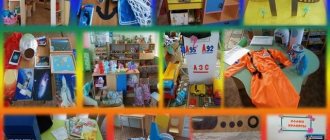The importance of role-playing games in the development of preschool children
“The game is a huge bright window through which into the spiritual world
the child receives a life-giving stream of ideas,
concepts about the surrounding world. The game is the spark that ignites
a spark of inquisitiveness and curiosity.” V.A. Sukhomlinsky.
The whole life of a preschooler is permeated with play; this is the only way he is ready to open himself to the world and the world for himself. Qualitatively new social requirements for the education system as a whole suggest that a developing society needs educated, moral people who can independently make decisions in situations of choice and are capable of cooperation. The above qualities of a modern personality are not formed in “adult life”. As you know, the foundation of a person’s worldview, character, and habits is laid from an early age. Therefore, today a “developing society” pays special attention to the education system in general and preschool education in particular.
The entire pedagogical process in a preschool setting is based on play activities. Through the variety of children's games, the authors of educational programs, teachers, and psychologists recommend raising, developing and training a preschool child.
Game is one of the main forms of organizing the process of education, training and development in kindergarten. In addition, play is a unique way of learning social experience, characteristic of preschool age. In the game, all aspects of the child’s personality are formed, significant changes occur in his psyche, preparing the transition to a new, higher stage of development. This explains the enormous educational potential of play, which psychologists consider a leading activity. The educational significance of the game largely depends on the professional skills of the teacher, on his knowledge of the child’s psychology, taking into account his age and individual characteristics, on the correct methodological guidance of children’s relationships, on the precise organization and conduct of all kinds of games. Just as many shades appear with play in the pedagogical management of the educational process.
Among all games, a special, leading place is occupied by a plot-based role-playing game. This is a game in which children take on the roles of adults, and in imaginary play conditions specially created by them, they reproduce the activities of adults and the relationships between them.
Story play is the most attractive activity for preschool children. Its attractiveness is explained by the fact that in the game the child experiences an internal subjective feeling of freedom, the subordination of things, actions, relationships - everything that in practical productive activity offers resistance and is difficult to achieve. This state of internal freedom is associated with the specifics of the plot game - action in an imaginary, conditional situation. The central point of role-play is the role that the child takes on. At the same time, he does not simply call himself by the name of the corresponding adult “I am a builder”, “I am a doctor”. The child acts like an adult whose role he has taken upon himself. Every role contains its own rules of behavior, taken by the child from the surrounding life, borrowed from relationships in the adult world. For preschoolers, a role is an example of how to act. Based on this sample, the child evaluates the behavior of the participants in the game, and then his own.
The plot-role-playing game does not require a real, tangible product from the child; everything in it is conditional, everything is “as if”, “make-believe”. A child can hammer imaginary nails with a toy hammer; can be a “doctor” and “treat” sick dolls. All these “possibilities” of story-based play expand the practical world of the preschooler and provide him with internal emotional comfort.
Most games reflect the work of adults: children imitate their mother’s household chores, the work of a teacher, doctor, driver, etc. The games instill respect for all work, emphasize its significance and benefits for society, and affirm the desire to take part in it ourselves.
Gaming activity influences the formation of arbitrariness of behavior and all mental processes. Performing a play role, the child subordinates all his momentary, impulsive actions to this task. In the game, children concentrate better and remember more than when given direct instructions from an adult.
Role-playing play is of particular importance for the development of imagination. Game actions take place in an imaginary situation; real objects are used as other, imaginary ones. The practice of acting in an imaginary space helps children acquire the ability to creatively imagine.
What conditions are necessary for children to have the opportunity to show creativity in story games, so that these games are attractive?
Firstly, it is necessary that the content of the games correspond to the interests and capabilities of children, and the characteristics of the children's subculture.
Secondly, pedagogical support for story-based games should be built taking into account the gradual increase in the child’s independence and creativity.
Thirdly, the subject-play environment of a kindergarten should be dynamically changing, and children should take part in its creation.
The famous researcher of children's games E.O. Smirnova compares the current state of play activity of preschoolers with an environmental disaster - the mechanism for transmitting play has gone wrong. This means we need to help children, because play is a child’s life itself, instinctive, associated with exploration, communication and self-expression, combining action and thought, bringing satisfaction and a sense of success (“Declaration of the Child’s Rights to Play”).
Role-playing play is a complex formation that contains both elements of the development of role-playing behavior and elements of mutual coordination of actions. While playing with peers, children begin to take into account the desires and actions of the other child, defend their point of view, and build and implement joint plans. Play has a huge impact on the development of children's communication during this period.
Numerous studies indicate that with tactful, pedagogically appropriate guidance, the game helps to enrich the child’s horizons, develop imaginative forms of cognition (imaginative thinking, imagination), strengthen his interests, develop speech, as well as the moral development of the child.
What principles should a role-playing game be based on? 1. The teacher must play with the children. 2. The teacher should play with children throughout preschool childhood; at each stage, the game should be developed in such a way that the children immediately “discover” and assimilate a new, more complex way of constructing it.
Thus, the educational possibilities of role-playing games are extremely great, and it is important for a teacher to be able to implement them. The game can turn a lazy person into a hard worker, a ignorant person into a knowledgeable person, and an inept person into a skilled person. It helps to unite the team and include withdrawn and shy children in active activities. Games instill conscious discipline; children are taught to follow rules, justice, the ability to control their actions, as well as correctly and objectively evaluate the actions of others.
List of information sources.
- Alyabyeva E.A. Moral and ethical conversations and games with preschoolers. M.: TC Sfera, 2004, - 128 p.
- Vinogradova N.A. Role-playing games for older preschoolers: a practical guide / N.A. Vinogradova, N.V. Pozdnyakova – M.: Iris-press, 2008 – 128 p.
- Grishina G.N. Favorite children's games. - M., 1997.
- Doronova T.N., Karabanova O.A., Solovyova E.V. Play in preschool age: a manual for kindergarten teachers. M.: Education of a preschooler, 2002, 128 p.
- Games for preschoolers. - M., 1995.
- Mikhailenko N.Ya., Korotkova N.A. How to play with a child. – M., 1990.
- Novoselova S.L. Developing object-based play environment for childhood. World “Quadro” // Preschool education, 1998. No. 4.
- Polyakova M.N. Construction of a developmental environment in groups for children of senior preschool age // Preschool pedagogy. 2004. No. 1. p. 12-15.
Let's play at life
There is no game without a plot.
The plot is the main element of a role-playing game. There will be no game without it. The plot is the area of activity that children reproduce. While playing, a preschooler reproduces actions, events, relationships from life, while his play actions (examining a patient, preparing a pie, building a house, etc.) are the main means by which he realizes the plot. The plots of the games are different.
“Did you know that game plots change over time? Their content depends on the historical period, the state of the country’s economy, natural and geographical features of the area, and cultural traditions. There are also plots of games without time, for example, in “Hospital”, “Family”, “School”.
The next important element of the game is its content , which the child embodies through a certain role. The role is the main component of the game and the means of implementing the plot. A role for a child is his position. That is, the child, accepting a role, identifies himself with some hero and lives in the game according to the principle of conformity to this role, based on his own ideas. The role is based on rules of behavior that the baby borrows from the adult world, adopting the behavior of adults. Already at three years old, the child wants to act not only independently, but also like an adult.
One of the features of role-playing games is their social orientation
Features and benefits of role-playing games:
- Certain rules and their observance by children.
- Social orientation of games.
- Rich emotional palette.
- Development of intelligence.
- Active development of creativity.
- Speech development.
By playing role-playing games, the baby develops intensively and diversified.
What is fun for 5-6 year olds to play?
The games of middle and older preschoolers are characterized by the integrity of the plot and the interconnectedness of events.
A child of 5-6 years old is no longer interested in the game itself, but in the relationships between the characters. This is why children do not like to take on roles that are unpleasant or incomprehensible to them. At this age, children interact through speech, and games become very emotional. In games, dialogues are of great importance - it is with the help of them that interaction is established between the participants in the game.
The games of middle and older preschoolers are characterized by the integrity of the plot and the interconnectedness of events. The guys carefully select the plot of the game and plan its development. They react very emotionally and vividly to the events that unfold during the game. Here they show their creativity, imagine, invent.
The plot-play activity of a 5-6 year old child is characterized by:
- distribution of roles before the start of the game
- transition to role-playing actions that reflect the social functions of people
- a solid logical plot
What games might interest a 5-6 year old child?
- "In library"
- "Cosmonauts"
- "Providing medical care"
- "Family"
- “Circus” (“Magicians”, “Artists”)
- "In the cafe"
- "Trip around the world"
- "On the roads of the city"
- "Olympics"
- "In a workshop"
- "At a car service station"
- "Pharmacy"
- "Mail"
- "In airplane"
- "School"
- “At the Exhibition” and many others.
Watch a video about role-playing games in kindergarten
Remember that role-playing games in the life of preschoolers are a very important activity. In such a game, the child develops mental, creative and communication abilities. Encourage children to play and come up with new stories, help them.




